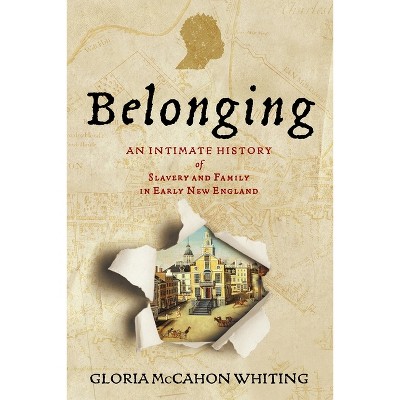Sponsored

Boundaries of Belonging - (Early American Studies) by April Lee Hatfield (Hardcover)
$42.49Save $2.51 (6% off)
In Stock
Eligible for registries and wish lists
Sponsored
About this item
Highlights
- In the decades following England's 1655 conquest of Spanish Jamaica, the western Caribbean became the site of overlapping and competing claims--to land, maritime spaces, and people.
- About the Author: April Lee Hatfield is Associate Professor of History at Texas A&M University and author of Atlantic Virginia: Intercolonial Relations in the Seventeenth Century, also available from the University of Pennsylvania Press.
- 320 Pages
- History, Caribbean & West Indies
- Series Name: Early American Studies
Description
About the Book
"Boundaries of Belonging shows how, in an early modern Caribbean of overlapping and contested borders, a mobile and diverse population that included pirates, smugglers, freedom seekers, and religious refugees, influenced theories of imperial belonging and interpolity law"--Book Synopsis
In the decades following England's 1655 conquest of Spanish Jamaica, the western Caribbean became the site of overlapping and competing claims--to land, maritime spaces, and people. English Jamaica, located in the midst of Spanish American port towns and shipping lanes, was central to numerous projects of varying legality, aimed at acquiring Spanish American wealth. Those projects were backdrop to a wide-ranging movement of people who made their own claims to political membership in developing colonial societies, and by extension, in Atlantic empires.
Boundaries of Belonging follows the stories of these individuals--licensed traders, smugglers, freedom seekers, religious refugees, pirates, and interlopers--who moved through the contested spaces of the western Caribbean. Though some were English and Spanish, many others were Sephardic, Tule, French, Kalabari, Scottish, Dutch, or Brandenberg. They also included creole people who identified themselves by their local place of origin or residence--as Jamaican, Cuban, or Panamanian. As they crossed into and out of rival imperial jurisdictions, many either sought or rejected Spanish or English subjecthood, citing their place of birth, their nation or ethnicity, their religion, their loyalty, or their economic or military contributions to colony or empire. Colonial and metropolitan officials weighed those claims as they tried to impose sovereignty over diverse and mobile people in a region of disputed and shifting jurisdictions. These contests over who belonged in what empire and why, and over what protections such belonging conferred, in turn helped to determine who would be included within a developing law of nations.Review Quotes
"Boundaries of Belonging is a valuable tool for maritime historians, as it explores the Caribbean from the perspective of migratory groups who moved across borders and jurisdictions, sometimes aided by the competing empires and sometimes being chased by them. This interaction within the maritime space of the West Indies led to the creation of new communities within the imperial fold, and Hatfield's intra-Caribbean methodological approach facilitates her study. Finally, the overarching argument that Britain's ultimate domination of the seas confirmed the establishment of 'whiteness', not religion, as a marker of civilization is backed by strong evidence, making this book an exciting and important resource for maritime historians."-- "International Journal of Maritime History"
"[A] much-needed legal and relational understanding to Jamaica's well-chronicled evolution from a haven for upstart sea raiders to an established exemplar of the plantation complex...Boundaries of Belonging successfully reframes early English Jamaica's transition from pirate hub to slave-trading entrepôt as resulting from changing understandings of Spanish conceptualizations of imperial identity. Among Caribbean and Atlantic historiographies so attuned to individual subaltern resistance and self-fashioning of identity, we need more work like this to illuminate how empires evolved, particularly in relation to one another. Hatfield enlightens us on this process by examining legal understandings drawn up in London and Madrid, but also by attending to how those policies were interpreted in places such as Kingston and Cartagena."-- "William & Mary Quarterly"
"Throughout the book, Hatfield showcases a particular skill at closely analyzing a particular incident or local conflict, in order to uncover broader regional and imperial ramifications. Taken as a whole, Boundaries of Belonging profitably illumines competing discourses of imperial belonging and exclusion, revealing how these conceptual disputes shaped the lives of imperial subjects, non-subjects, and potential subjects across the circum-Caribbean."-- "Hispanic American Historical Review"
"This fascinating book untangles the forces that shaped concepts of belonging and identity in the early colonial Caribbean...Hatfield delves into themes of trade, ethnicity, race, and birthplace to complicate the means and meaning of belonging. Pirates, Sephardic Jews, enslaved peoples, Indigenous communities, and others added new dimensions to the complexities of belonging. English conquest of Jamaica provided novel ways of thinking about identity as English colonists, seeking to capitalize on Spanish wealth, confronted the fluidity of Catholic affiliation. This process in turn galvanized English constructs of whiteness."-- "Choice"
"Boundaries of Belonging fits seamlessly into a growing body of historical scholarship concerning race, empire, and the Caribbean. Historians of slavery, piracy, the Caribbean, or the Spanish or English empires stand to learn from Hatfield's research approach, clear prose, and meticulous attention to detail. This text deserves a spot on comprehensive exams lists for students in Atlantic and Caribbean history and as a syllabus staple for any course concerning empire, race, or archival methods."-- "H-Early America"
"April Lee Hatfield has written a deeply researched and carefully argued study of the racial politics of political community formation in early Jamaica. Boundaries of Belonging is essential reading for anyone interested in the intertwined histories of race, slavery, and political belonging in the Atlantic world."-- "Lauren Benton, Yale University"
"Out of the many possible identities anyone could claim at the entangled borders of empire, those who claimed to be 'English' made race their linchpin, while 'Spaniards' deliberately did not. In this eye-opening and groundbreaking study, April Lee Hatfield illuminates how the construction of 'Anglo' and 'Latin' narratives of exclusion and belonging in the body politic began as early as the mid-seventeenth century in and around Jamaica. Boundaries of Belonging is sure to become a classic on the comparative history of race in the continent."-- "Jorge Cañizares-Esguerra, University of Texas at Austin"
About the Author
April Lee Hatfield is Associate Professor of History at Texas A&M University and author of Atlantic Virginia: Intercolonial Relations in the Seventeenth Century, also available from the University of Pennsylvania Press.Dimensions (Overall): 9.1 Inches (H) x 6.3 Inches (W) x 1.1 Inches (D)
Weight: 1.3 Pounds
Suggested Age: 22 Years and Up
Number of Pages: 320
Genre: History
Sub-Genre: Caribbean & West Indies
Series Title: Early American Studies
Publisher: University of Pennsylvania Press
Theme: General
Format: Hardcover
Author: April Lee Hatfield
Language: English
Street Date: April 4, 2023
TCIN: 94326813
UPC: 9781512824018
Item Number (DPCI): 247-50-9312
Origin: Made in the USA or Imported
If the item details aren’t accurate or complete, we want to know about it.
Shipping details
Estimated ship dimensions: 1.1 inches length x 6.3 inches width x 9.1 inches height
Estimated ship weight: 1.3 pounds
We regret that this item cannot be shipped to PO Boxes.
This item cannot be shipped to the following locations: American Samoa (see also separate entry under AS), Guam (see also separate entry under GU), Northern Mariana Islands, Puerto Rico (see also separate entry under PR), United States Minor Outlying Islands, Virgin Islands, U.S., APO/FPO
Return details
This item can be returned to any Target store or Target.com.
This item must be returned within 90 days of the date it was purchased in store, shipped, delivered by a Shipt shopper, or made ready for pickup.
See the return policy for complete information.
Trending Non-Fiction

$15.68
Buy 2, get 1 free select books
4.8 out of 5 stars with 180 ratings

Highly rated
$19.31
was $20.98 New lower price
Buy 2, get 1 free select books
4.1 out of 5 stars with 53 ratings

$19.58
MSRP $29.00
Buy 2, get 1 free select books
4.7 out of 5 stars with 11 ratings

$4.59
MSRP $7.99
Buy 2, get 1 free select books
4.8 out of 5 stars with 116 ratings

$6.20
MSRP $10.95
Buy 2, get 1 free select books
4.8 out of 5 stars with 32 ratings

$7.09
MSRP $9.99
Buy 2, get 1 free select books
4.9 out of 5 stars with 45 ratings





